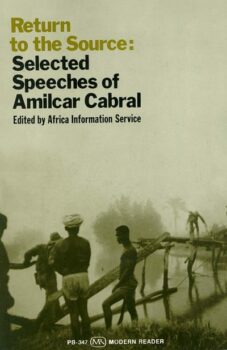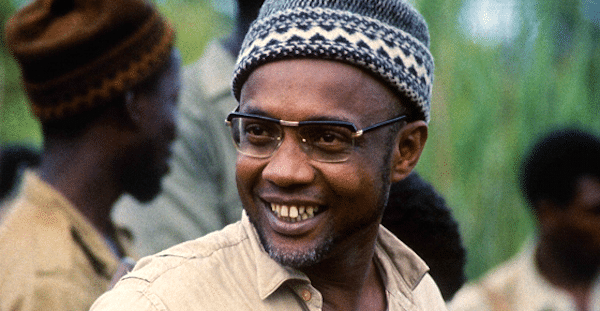
Return to the Source: Selected Speeches of Amílcar Cabral,. Edited by Africa Information Service, Revised and Expanded by Tsenay Serequeberhan (New York: Monthly Review Press, 2023), 189pp., $20 paperback, $12 ebook, $89 cloth.
Only leftwing activists in Southeast New England are likely to have been fortunate enough to watch, if probably not take part, in the upsurge of Cape Verdean/American activism during the 1960s-80s. Immigrants from the little islands off the West Coast of Africa, in spits of land used for the slave trade, had early become sea hands by force of necessity. Hundreds or perhaps thousands had come ashore as early as the 1820s, intermarrying with Free Blacks and with Indigenous people. By the middle of the twentieth century, a significant number had become active in the National Maritime Union (NMU) dominated by the Left until McCarthyism swept labor. Charles Fortes, a legend in his own time, led the radicals, who sometimes joined the Communist Party but more often a branch of the International Workers Order (closed by courts in 1950), succeeded by local ethnic clubs with living memories of better times.
The story does not end here. For a time during the 1960s-70s, some descendants of Cape Verdeans became active supporters of the Black Panther Party, an affiliation or sympathy mirrored by a wider excitement around the revolution against the Portuguese colonialists on the islands and what would become Guinea-Bissau, on the mainland. This reviewer can testify to the crowds gathered in Providence, Rhode Island, to hear visiting speakers, but cannot testify to what was said. The “patois” or particular language of Cape Verdeans, a unique variant of Portuguese, did not even have a Cape Verdean/English dictionary until near the end of the twentieth century!
There our story of the book begins, generations previous. Amílcar Cabral (1924-73), raised in Bafata, the second-largest city in what would become the new country, showed great early promise as a student. The Portuguese colonists, unable to create a large or stable bureaucracy as richer European countries developed in Africa, promoted select “natives” to manage the bureaucracy of the region. Attending a Technical University in Lisbon during the 1950s, he met with others from Portugal’s African colonies and with them became active in planning an escape from the “methods” of the European “masters.”
A precocious thinker, Cabral rapidly assimilated their leading ideas, that is, Africanness, a rejection of prevailing European doctrines. This rejection had become easier after the Second World War, when the weakness and self-destructive nature of Europe had exposed any ideology of white superiority. The dictator of Portugal, António de Oliveira Salazar, continued to insist that Africa did not “exist,” that is, Africans were only a dark and inferior reflection of true human civilizations. If we do not recall that the famed anticommunist philosopher name this person fought tooth and nail against the establishment of Black History courses and departments during the late 1960s, we can scarcely appreciate how pervasive this view remained, and how many liberals shared the assumptions with conservatives.
Cabral, like Fanon and the Cameroonian philosopher Marcien Towa, among others, stressed that Africans needed to reclaim their humanity and their Africanness but that being exploited by fellow Africans provided no solution. National independence, when achieved, would offer temptations of neocolonial domination in a thousand forms, including prejudices of color and religion among Africans.
Return to the Source, a condensation of Cabral’s developing ideas until his assassination by Portuguese agents in 1973, reveals an astounding intellectual sophistication expressed in formulations clear enough for even the less educated among his audience of fellow Africans.
He explains that mainland Guinea, where most of the struggle takes place, has no mountains for guerillas to find an escape, but considerable distances between the limited urban areas. The weak Portuguese colonialists never gained much of a foothold outside the cities and became vulnerable to an organized guerilla force. The semi-assimilated section of the population, elsewhere a privileged group vulnerable to bribes of a better life than the “natives,” never reached two percent. For the same reasons, the division of leaders from followers among the revolutionary movement remained limited, even when the leadership necessarily arose from the educated petit bourgeoisie. Too weak to turn native land over to European settlers, the Portuguese did not challenge the common ownership of fertile zones, although the relationship of the occupier to the elite among chiefs offered temptations to the powerful, or rather, shared anxiety toward revolutionary change.
Cabral is singularly clear and predictive, for instance, in arguing that NATO is forever a source of colonialism and neocolonialism in supplying the Portuguese with weapons and strategy. Further, that African neighbors could not be counted upon to provide adequate support for the ongoing struggle, leaving what was then the East Bloc to fill the gap. As the military struggle advanced and the Portuguese held ever fewer sections of the country, cultural issues became more crucial: “national liberation is necessarily an act of culture.” (p.83).
This is a most subtle point. The cultural gap between the educated and uneducated, which consolidates the advantages of assimilating the European way of thinking and living, grows with the struggle. The old differences of class within the African population become more apparent, as those successful in colonial society, come to see their access to European-style education, their connections with mosques, their ability to travel and so on, as rightful possessions threatened by the struggle around them. Even the revolutionary leaders, Cabral warns, are mostly likely to come from this class, and find themselves culturally alienated from the masses.
Happily, a generation of left-wing scholars, mostly notably Basil Davidson, had established that an African genius of centuries standing existed in art and culture, not to mention the engineering genius to develop societies in the most extreme circumstances of floods, plagues, deserts, and so on. Cabral warns especially against an easy utopianism of thinking that the condition of local reality, geographical or cultural, can be ignored in offering a way out of colonialism. Ideology or ideas, even Marxist ideas, will not in themselves suffice.
Cabral says near the end of the book, in a crucial response to a question about Pan Africanism, that W.E.B. Du Bois is the real father of Pan Africanism and that this goal is not easily reached. He says Nkrumah had told him, “If I were to begin again, my approach would be different.” (p.153) It was not something to be assumed on the basis of race, Africanness. or anything else It had to grow out of the collective struggle for self-recognition.
At Cabral’s death, a great thinker, strategist and humanitarian was lost to the global struggle against colonialism and neocolonialism. Yet his work and memory remain, full of insights and inspiration.

